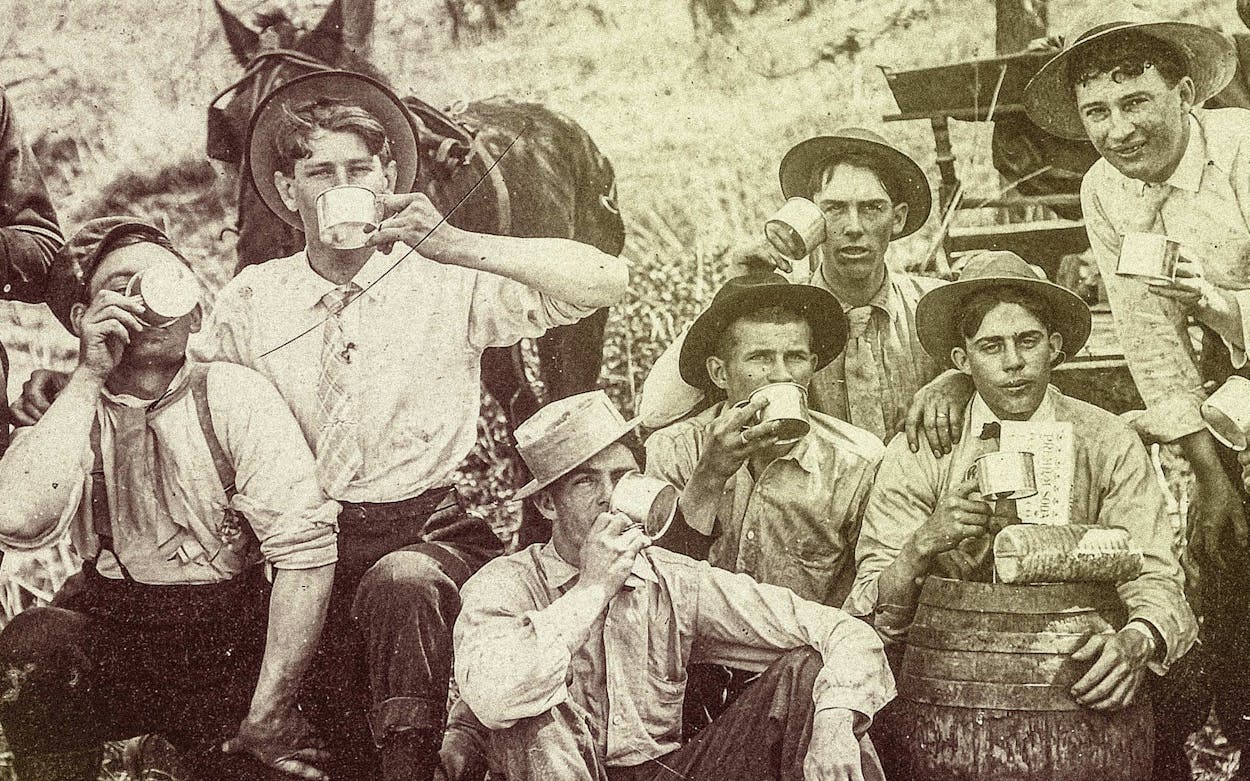While we mostly associate pecans with fall treats like pecan pie, pecan bars, and pecan-infused cocktails, there’s another culinary tradition that’s less talked about but as old as the Lone Star State itself: pecan coffee.
When I think of coffee and pecans, I conjure up images of my maternal grandmother, Rosie Lee, letting me sip coffee the color of my brown face from the saucer of her teacup while we sat outside waiting for her 11 a.m. “stories” to come on. She drank coffee daily and made many beloved Southern confections filled with pecans. But there’s a more literal interpretation of pecan coffee that has roots in Indigenous American cultures.
Pecans have been an integral part of the region since at least 6750 BCE, when many Indigenous tribes not only ate but also traded the nut, using it as a form of currency throughout the southern parts of the United States. The word “pecan” has its origins in the Algonquian language and is believed to have been derived from their word “pakani,” which roughly translates to “nut that requires a stone to crack.”
But once you do crack it, the interior meat is soft and yielding, offering a slightly sweet flavor with subtle hints of caramel. This familiar flavor lent itself beautifully to powcohicora, a highly nutritious, fermented nut-milk drink Native Americans enjoyed for many centuries. And it was only a matter of time before the pecan’s pleasant flavor, richness, and aroma were incorporated in other ways—especially during times of economic stress.
During the Civil War, although coffee was a staple for most soldiers, it was a “delicious luxury” for Southern soldiers, as Union officer Régis de Trobriand remarked in his memoirs, dated 1867. At the start of the war, President Abraham Lincoln’s blockade on harbors in the South prevented the importation of java. Just as New Orleanians adapted their coffee to include roasted chicory root, civilians and soldiers in other states were forced to find creative alternatives. Coffee substitutions in Texas included the almighty pecan and its shells, which were both crushed, then roasted, before being added to a small portion of coffee. The material was steeped in hot water to stretch the precious few grounds they had. The result was a balance of flavors from the bitter coffee and the naturally sweet pecan.
Meanwhile, our Mexican neighbors were consuming atole de nuez, traditionally prepared with pecans that had been drunk for many generations. Several Texas newspaper articles referred to the drink as pecan tea. The October 1899 issue of the Lampasas Leader advertised a ladies’ social serving pecan tea, and an April 1912 article in a Brownsville newspaper told the story of Mexican settlers who gathered around cut pecan trees hoping to salvage the limbs to make pecan tea.
The tea was prepared and served similarly to pecan coffee, to be enjoyed in the morning. The entire nut—including the shell—was pulverized into a smooth paste, and mixed into milk or water. Then, a bit of cornstarch was added to thicken up the drink, as well as cinnamon for sweetness. Today, variations of this drink made with walnut or strawberry can be commonly found in Mexican bakeries and ice cream stores, or in grocery chains that carry Latin products.
Andrea Pedraza, co-owner of CocoAndre Chocolatier & Horchateria, a gourmet chocolate shop specializing in Mexican-inspired treats, in Dallas, recalls pecan tea from her childhood in Mexico. “I remember the traditional version of this drink and its history being shared within our family,” she says. “I’ve always thought [pecan coffee and atole de nuez] were connected and I love how our cultures become a fusion we can share.”
Though years have passed and coffee is no longer in short supply, Texans kept the tradition going, and you can find pecan-flavored coffee on the shelves of just about any grocery store. (Texas also happens to be one of the largest exporters of pecans in the country.) Texas brands such as Fredericksburg Pecan Company and Alamo Pecan & Coffee offer an array of pecan-flavored coffees, from lightly roasted varieties that highlight the nut’s natural sweetness to dark, smoky blends that provide a bold and robust experience.
Another exceptional pecan coffee comes from Rattlesnake Ranch, a pecan farm with a retail store in the East Texas town of Crockett, an hour and a half from Houston. Owner Clint Craycraft grew up nearby, and his earliest memory of pecans involved running around his great-grandmother’s backyard. “At Christmastime the highlight of my day was running to the backyard and picking pecans to crack and eat them,” he says.
He and his wife, Hannah, purchased the pecan operation in 2016, and offer pecan coffee and other unique pecan food and beverage items in their gift shop. “Pecan coffee has always been a staple for many people,” Craycraft says. It’s one of their best sellers.
And as we go deeper into pecan season this autumn, there’s more opportunity to indulge in this tradition yourself, either by purchasing premade drinks or beans, or boldly foraging for the sweet nut and re-creating the brew on your own.
- More About:
- Mexico






